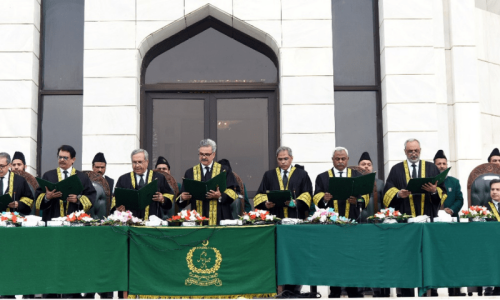“This movement appeared as a ray of hope for the Baloch and Balochistan — who had been silenced through brute forces for the last seven decades — where peaceful demonstrations had become a sin” — Press release, Baloch Yakjehti Committee (Islamabad).
BALOCHISTAN has become a dystopian society. To adapt Churchill’s quote on democracy, false FIRs are considered the best of the worst form of injustices. Even extrajudicial killings are acceptable as opposed to the state policy of enforced disappearances/ missing persons. For the victims’ families, false FIRs and extrajudicial killings provide a paradoxical sense of stability to cruel injustices since they at least know whether the victim is dead or alive.
It is enforced disappearances/ missing persons which confounds victims’ families. But why have peaceful demonstrations become a ‘sin’ and what does this lack of solution to the long-term problem of enforced disappearances reveal in the context of the Baloch missing persons?
State policy: The Pakistani state engages in enforced disappearances as a state policy in unique fashion. This uniqueness lies in the fact that the state not only acknowledges that enforced disappearance is state policy, and not the action of rogue elements, but, appallingly, uses this honest disclosure as an excuse to continue to engage in such disappearances.
Let me explain these two aspects. It is an undeniable fact that enforced disappearance is a consistent state policy because, firstly, the Pakistani state itself established the Commission of Inquiry on Enforced Disappearances as far back as 2010, which is shockingly still functional after more than 13 years.
The Commission received 9,967 cases up to August 2023, out of which 2,708 belong to Balochistan. It may be noted that the very term ‘enforced disappearance’ by definition means that abduction and confinement are carried out by officials of the state.
Secondly, the then Commission chairman, retired justice Kamal Mansur Alam and two other retired justices, in their report dated Dec 31, 2010, have systematically documented the state’s institutional policy of enforced disappearances.
Thirdly, Hein G. Kiessling, in his book Faith, Unity, Discipline, has attached statements, which he claims were sent to him by Pakistan’s premier intelligence agency, acknowledging the practice of enforced disappearances in Pakistan.
The Pakistani state engages in enforced disappearances as policy in unique fashion.
Fourthly, in addition to the Commission of Enquiry on Enforced Disappearances, and considering the seriousness of the issue, the state also established the Federal Task Force on Missing Persons in 2013 to give recommendations to resolve this problem. But, what is shocking is that despite these damning admissions, the cases received/ registered at the Commission continue to grow every month (for example, 157 in July 2023, 74 in August 2023), which discloses a dangerous trend.
This trend is that, instead of gradually eliminating the practice of enforced disappearances, the Commission has become a clearing house for the rationalisation and stabilisation of this unconstitutional injustice.
Silver linings: Repression breeds resistance and this resistance in the context of the missing Baloch has come from mainly two quarters. Firstly, the mobilisation of the Baloch people in particular and Pakistani society in general against enforced disappearances is the result of various movements led by individuals such as Mama Qadeer, Dr Mahrang Baloch, Amna Janjua and many other women and men.
To take the example of the current long march led by Dr Baloch, her political wisdom, mobilisation strategy, narrative building and sheer courage, puts to shame the “establishment democracy” (a term used by political scientist Dr Mohammad Waseem) of the mainstream political parties by exposing their irrelevance to the Baloch masses. Moreover, the current societal consensus against enforced disappearance is mainly the result of such warrior women and children, Baloch and non-Baloch.
Secondly, on the plane of constitutional and legal theory and practice, there is now judicial consensus that enforced disappearances are the worst form of constitutional evil, a “crime against humanity” as declared by the Pakistani Supreme Court. But no judicial issue requires more judicial courage than to speak for the missing Baloch. And in coming to the rescue of the missing Baloch, the names of four judges stands out: former CJP Iftikhar Chaudhry, former CJP Jawwad Khawaja, Justice Athar Minallah and Justice Mohsin Akhtar Kayani. Their pen may have been defeated by the sword but the sword’s true colours have also been exposed.
No solution: These silver linings apparently give the impression of hope for a possible solution to the enforced disappearances problem, but sadly, it is really a false dawn for the following reasons.
Firstly, unlike the rural-based, sardar-led and incipient nationalism of past Baloch insurgencies, the present insurgency is urbanised, has mobilised society on a large scale — and, crucially, includes Baloch women — is youth-based, is middle class-led and has developed into a fully developed nationalist movement. A state which tries to counter nationalism through enforced disappearances is interested in suppression, not solutions.
Secondly, the intention and policy of the state is clear from the fact that it is headed by a caretaker prime minister, who believes the ballot/ democracy is not the solution to the Baloch problem.
Thirdly, the trend in national as well as Baloch politics has radically shifted to establishment democracy, especially since 2017, and enforced disappearance is the last item on the agenda of the mainstream parties.
Lastly, as noted earlier, the Commission of Enquiry on Enforced Disappearances received 9,967 cases up to August 2023, out of which 2,708 belong to Balochistan. But not a single state official has been held responsible for enforced disappearances in the last over two decades. Impunity breeds contempt for law and justice, and such contempt, in turn, breeds continuing repression.
In short, the missing Baloch is not merely about physical disappearance but also reveals the wishful thinking that ethno-nationalism can be vanquished through enforced disappearances.
In this period of state repression and policy delusion, the only thing which makes sense is the immortal verses of Faiz Ahmed Faiz’s 1974 poem on Bangladesh where the poet comments sadly on irreconcilable estrangement even after many civilities:
ہم کہ ٹھہرے اجنبی اتنی مداراتوں کے بعد
پھر بنیں گے آشنا کتنی ملاقاتوں کے بعد
The writer is a lawyer.
Published in Dawn, December 30th, 2023













































